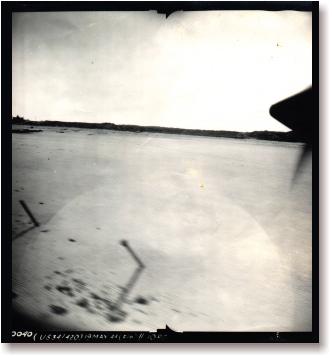Part II

|
For the demolition work each of us carried a quantity of a pliable explosive substance stuffed into ordinary cotton stockings. We were to wrap these around the poles, close to the ground, then connect them all with prima cord, a kind of explosive rope. A fuse was then attached to the network of cord --- fuses which had been kept waterproof by being sealed in condoms. When we were preparing that gimmick earlier, there were many remarks about the waste!
Just when we had made ready and were about to fire the charge, an infantry detachment landed. We yelled at the colonel leading them to keep his people back, for they'd be blown to bits if they came forward through the poles just then. He and his men flattened themselves out on the sand and we pulled the fuse. We must have done something right, for we got a successful blow, the blast of the charge ringing each pole pinched it in two, and they all toppled.
The first part of our mission was now completed; we had felled the posts, and the tank-dozer could clear them away to create a path through the obstacles, which, in addition to the posts, consisted of many X-shaped iron constructions which were about two feet high, fashioned from short lengths of railroad rails. They resembled the jacks children play with.
The next task was to search for mines in the sand. The man who carried the mine detector had soon been killed, and I picked up the instrument and began to use it. By now the tank-dozer had arrived and was beginning to clear away the fallen poles and "jacks". I happened to be a few yards in front of the dozer when some unfriendly soul on the Wehrmacht side got a bead on me; I dropped, hit presumably by machine-gun fire.
"That tank-dozer is going to run over me", I thought, and tried to move out of its way without much success. (Later, in the hospital in England, I saw the driver and he assured me he'd seen my fall and wasn't about to run me down.)
A Medic came up --- a terribly young-looking boy --- and knelt beside me to help. He was burdened with so much gear that he apologized for not being able to reach behind himself to get out medications and bandages. I told him to turn around, tell me what to look for, and I'd fish it out of his bulging knapsack. While we were doing this he muttered, "Lieutenant, I'm scared shitless". I assured him he wasn't the only one.
The tank-dozer was put out of commission, so there was no more worry about being run over, but lying flat on my back, I felt water at my feet and realized that the tide was coming in. Now there was a new danger: I could drown here. I tried to scootch up higher, but the tide was faster than I could move; I owe my life to a couple of the men who sized up the situation and helped me to a position above the high-water line.
Now, it looked as if I might survive, and I wished that I had my movie camera with me, since it was impossible to get up and do anything useful. The morphine which the medic had administered made me groggy, although still quite aware, and I don't know how long I was there --- maybe an hour --- before friendly hands put me on a stretcher and carried me to a big landing barge which had just disgorged its load and was taking wounded aboard. A missile hit its superstructure and splattered fragments around, but we backed out safely and drew alongside a destroyer far out to sea, which took us wounded on and put us in sick bay bunks. Again I could only marvel at the clockwork precision of the whole operation: if you needed something, say a destroyer for instance, there it was, waiting for you!
Today, forty years later, an invasion of this sort would simply be impossible, for a single modern nuclear weapon could wipe out such a fleet. The Allies were lucky Germany didn't have an atomic bomb.
